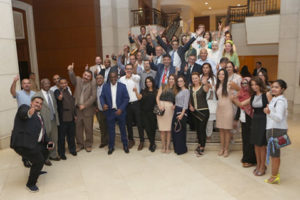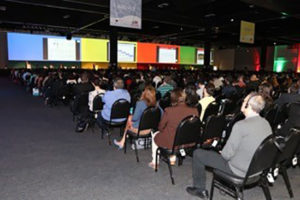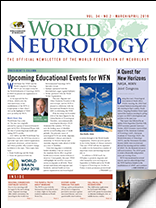By Raad Shakir
Over a period of six months, four major neurological congresses were held in four regions of the world. Each was organized by one of the regional organizations, which are part of the six regions of the WFN.

Pan Arab Union of Neurological Societies (PAUNS) in Amman, Jordan.
The total number of attendees was impressive; more than 5,000 neurologists attended, making the gatherings major events in their own rights. One has to emphasize that neurologists working in these four regional organizations provide care for roughly 85 percent of the world’s population. In some localities, the care may not be supported by up-to-date technology or the ability to provide high-end acute or long-term neurological care.
In the age of instant communications, online journals, free availability of information, free daily updates, expedited publications, in addition to the deluge of emails, tweets, Instagrams, WhatsApp groups, to mention a few, neurologists still attend congresses in droves.

Pan American Federation of Neurological Societies Congress (PAFNS) in Sao Paolo, Brazil.
You can say with certainty that we have not replaced face-to-face meetings and sitting in large lecture halls listening to scientific presentations. If you are wondering why we continue to do this, I can offer some answers.
First, all of the modern electronic communications media have not replaced the personal encounter with lecturers and having the opportunity to ask questions. Oral or poster presentations, whether on a board or electronically, are opportunities for young neurologists to interact with those in the field and be put on the spot when asked some probing questions. It also adds to self-esteem when neurologists return to their departments having presented his/her or their group’s work at an international congress.
Second, in each of the four congresses, the additional attraction of being regional is that neurologists come to meet friends, past trainees, colleagues in neighboring countries, as well as to listen and interact with top speakers from other parts of the world. The congresses are big but still manageable with perhaps two or at most three simultaneous sessions allowing better attendance to satisfy the requirements of the delegates. On the other hand, attending larger congresses of the two other regions, whether American or European academies, is a completely different experience. Similarly, the World Congress of Neurology (WCN) is a big jamboree. Each one runs about a dozen simultaneous sessions, making it practically impossible to hop sessions.
Third, cost plays a role in these congresses. There is no doubt that it is cheaper to go regionally, and sponsorship is more accessible compared to long distance travel. Moreover, pharmaceutical support is regional rather than global. Funding therefore comes from different budgets, and this helps the organizers to attract support for exhibition and travel.
Fourth, is the practical issue of the kind of passport the delegate holds. Visas are a major problem, and at times, it is easier to travel to a regional country than to one that requires a visa. It is not unknown that passports can be held in embassies for several weeks awaiting approval. Moreover, the cost of a visa can be prohibitive, especially as the sponsors rarely pay for such expenses.
Fifth, if you look at other major general neurology congresses, the topics are by and large similar. International speakers who are invited to regional congresses roughly present the same material. In some larger congresses, the halls may be full, and it is not uncommon for delegates to sit on the floor or stand.

Asian Oceanian Congress of Neurology (AOCN) in Seoul, Korea.
In each of the four congresses, an additional meeting has been tagged, such as specialty, national society, or others. It seems that general congresses still attract attendances and sponsorships in the presence of specialty meetings in the same region. None of the four congresses could have been possible without the support and the tagging of national congresses to the regional one.
Financial Considerations
The two other regions (American and European academies) have been represented in these four congresses, taking the form of leadership presence and certainly speakers. Moreover, financial sponsorship was available from one regional organization to another. The World Federation of Neurology is omnipresent and has been highly represented in all the congresses offering moral, scientific, and financial support. This makes a difference to the regions when the international bodies are there with them.
The experience for each regional organization is crucial for their self-assurance and long-term viability. All four congresses now have well established management boards with regular free and open elections. This is vital for the survival of all neurological bodies. Congresses make profits, and this is plowed back to support local training and postgraduate education.
In some and soon hopefully all the four regions, there shall be separate training especially for young neurologists in regional courses and visiting fellowships. This will supplement grants from the WFN and more wealthy regional bodies. The ability of young trainees to travel in their regions to observe, criticize, emulate, and practice is growing and can only be beneficial to all.
One issue that needs to be stated in some of the four regions is that of continuing medical education (CME) certification. It is noted that in all the four congresses a certificate of attendance was provided. However, the requirement of mandatory CME in some countries is not a legislation that is followed. It is vital for regional organizations to contact local ministries of health or other medical licensing bodies to stressing the importance of continuing medical education and making CME mandatory for recognition in the specialty.
The four congresses are biennial in the years when there is no World Congress. This is excellent so that neurologists will have the opportunity to attend a major general neurology congress annually. It is quite noticeable that each of the four neurological associations has clearly prospered in the last few years. The benefits are both scientific and financial. The administrative structure is taking shape, and when the leadership of one attends the congress of the others, many practices are observed and hopefully emulated later.
As an observer of congresses since the WCN Kyoto 1983, the world still has an insatiable appetite for congresses. Long may that continue. •
Prof. Raad Shakir is the immediate past president of the WFN
